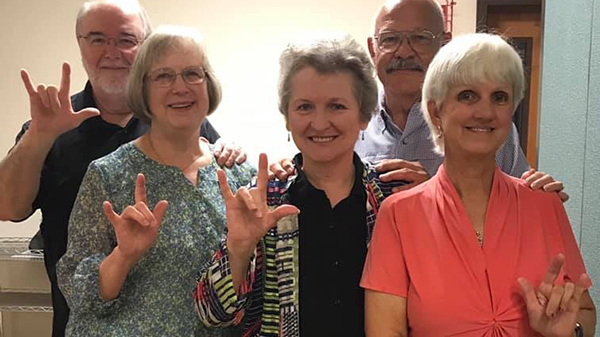Birmingham Community Deaf Church has a long history among Deaf worshippers, serving the Deaf community in the Birmingham area since 1957 by providing a preaching service in American Sign Language (ASL).
Established at Woodlawn Baptist Church (now The Church at Liberty Park, Vestavia) by Neal Peyton, the church became an interpretation ministry, changing locations several times through the 1960s and 1970s.
In 1982, Deaf members from local Deaf ministries met together at McElwain Baptist Church, Birmingham, and agreed to start a Deaf church.
By 1989 the congregation had sent its first missionaries, Stan and Lynn Stepleton, to serve the Deaf in Dominican Republic.
The church currently meets at Briarwood Church, Birmingham, and has 30 regular members. Interim pastor Cromwell Josey preaches in ASL, a more complete and natural experience for lifelong signers, according to experts in the language.
Permanent location
The church is led by Deaf worshippers who come from all over north central Alabama. The congregation supports missions, gives through the Cooperative Program and is active in the Birmingham Metro Baptist Association.
“We are looking for a permanent location like being in partnership with a Baptist hearing church so that the hearing children of Deaf parents can be ministered to,” Josey said.
Alabama’s Deaf Baptist churches receive resources and support from the Alabama Baptist State Board of Missions (SBOM) office of associational missions and church planting.
According to Kristy Kennedy, SBOM community ministries coordinator, three Deaf churches and 23 churches currently provide interpretive ministries.
Still, an estimated 1,500 Deaf people die every day without knowing Jesus.
By most estimates Deaf is one of the largest unreached people groups in the U.S. with only 1–2% attending any denomination.
Kennedy outlines three models of ministries for the Deaf:
- Interpretive ministry provides an ASL/English interpreter for weekly services and is the least effective model, not always meeting the needs of Deaf members.
- The Deaf ministry model involves a Deaf group within a large church with an interpreter for weekly worship, separate Deaf small groups and social events focused toward Deaf needs.
- The Deaf church model is the most effective with a separate Deaf church on the property of a sponsoring church. These congregations make their own decisions and have their own pastor with services in ASL.
Bethel Baptist Deaf Church (BBDC) is a Deaf church plant under the umbrella of Bethel Baptist Church, Dothan. It began in 2014 after 35 years of Deaf ministry and averages almost 40 in attendance with two deaf and blind members. Services are voice interpreted for hearing persons who attend.
Significant need
“BBDC is more of a regional church than a local Deaf church,” said Carmen Stewart, ministry team leader. One-third of the members travel up to an hour and a half to attend, she said.
According to BBDC pastor Jerry Pearson, Deaf congregations possess a significant need for visual accompaniments, like PowerPoint presentations, to enhance their understanding of the message.
The church also offers live video on Facebook for those unable to attend. Because many in the Bethel Deaf community have lower incomes, Bethel Baptist supports the church financially.
Bethel Baptist also offers a deaf adult Sunday School class taught by Robert Stewart, who helps with setup at the Deaf church in the Bethel gym each Sunday.
In the past year two deaf children have begun coming to Bethel, said BBDC coordinator Diann Pearson. So ministry team member Sharon Jones, who also is an interpreter, started a Sunday School class for deaf children.
“We felt it was important for them to have a class,” Diann Pearson said.
Steve Dye, SBOM Deaf ministry catalyst, said many Deaf churches begin as an interpretive ministry because someone in the church or community is not being served.
In his case the friendliness of Jacky Connell, pastor of Eden Westside Baptist Church, Pell City, led Dye to join in 2018 even though the church didn’t have a Deaf ministry.
Members were eager to serve the Deaf community, he said, and Eden Westside began an interpretive ministry in January 2019 with 12–15 in attendance.
The ministry transitioned to the Deaf ministry model in August, providing a Bible study group taught by the Deaf for the Deaf.
Since then attendance has grown to more than 40 and Eden Westside is providing ASL classes for those who wish to learn.
“We have had many come and visit but many prefer a Deaf Bible study class or Deaf Church service with a Deaf pastor,” Dye said.
Dye believes this will happen in God’s time.
“Eden Westside is in agreement with our group to be patient and wait for the right time to transition to the next and final step … a Deaf church,” he said.
‘Plan of action’
Interpretive ministries face unique challenges including inconsistency of interpreters and an inability to communicate well with hearing church members, Dye said.
“Having a way to communicate with the Deaf is a necessity to be able to minister to and with them,” he said. “Having a plan of action to reach out to them is a great way to start.”
To learn more about Alabama Deaf ministries visit www.deafministriesal.org or contact Kristy Kennedy at 334-613-2311.






Share with others: